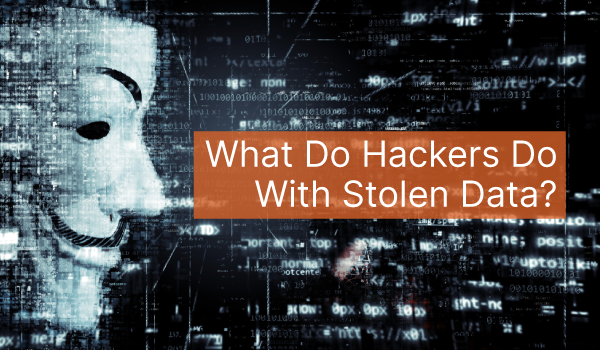Recent high-profile data breaches have made cyberattacks a hot topic, like the ransomware attack that impacted Canadian retail chain Indigo Books and the health insurance hack that affected the U.S. Congress. Due to incidents such as these, you probably already know that safeguarding your data should be a top priority for your organization. In fact, it’s likely been drilled into your head on repeat. Though, be honest with us…do you actually know how to mitigate the damage once a cyberattack occurs?
This article delves into where your data goes, answering the question: “What do hackers do with stolen data?” We explore what happens after a cyberattack, detailing what your company can expect and the steps you can take if you experience a data breach.
What Happens During a Cyberattack?
With a targeted attack, cybercriminals specifically choose your organization to exploit, employing methods like denial-of-service attacks (DDOS attacks) or cross-site scripting. Cybercriminals investigate their target to discover security flaws, then deploy sophisticated tools to access your data and go undetected; they may install malicious software to take over your infrastructure.
Detecting a cyberattack can be difficult, but knowing the signs can help stop one before it wreaks havoc. Our article “How to Know if You’ve Been Hacked” outlines red flags you might encounter.
What Hackers May Do With Stolen Data
1. Access Personal Accounts
Cybercriminals often steal data like email addresses and passwords to gain access to online accounts. Account takeover (ATO) attacks enable hackers to change your account information and lock you out. Once a hacker accesses one account, they may likely start to take over ones on other platforms, especially if the victim uses the same login details.
Businesses also face account takeovers when hackers access an employee’s personal account and use your infrastructure for purposes like cryptojacking to mine bitcoin.
2. Make Fraudulent Purchases
Once hackers access your credit card number, they can operate various scams to purchase items. Card-not-present fraud allows remote payments online or by phone, leading to criminals racking up significant debt on your behalf. They may also use your card information to create fake credit cards to enable in-person shopping.
3. Identity Theft
With your social security number and other stolen data, cybercriminals can apply for credit card accounts, government benefits, jobs, apartments, and even tax returns in your name. A growing problem is medical identity theft, where hackers access your health insurance to pay for medical devices, prescription drugs, and other services.
4. Loan Applications
Hackers may also use your stolen information when applying for loans on lending websites or at payday loan companies. They may use your stolen information to produce fake documents to apply in person or to create false companies to apply for business loans. They take the money, and then you deal with the debt.
5. Sell Data to Dark Web
Cybercriminals often conduct widescale cyberattacks to sell victim data in bulk on the dark web. In spaces inaccessible by your web browser or search engines, people have established underground marketplaces to spread your credit card number or other personally identifiable information to malicious actors.
What to Do If Your Data Has Been Stolen
Facing a data breach may feel daunting, but many strategies exist to mitigate the damage when you experience one:
- Contact the appropriate authorities to document the crime. This should be the first step after experiencing a data breach.
- Change your passwords on all accounts associated with the stolen credentials and freeze any compromised credit cards.
- Implement Multi-Factor Authentication on all of your accounts where available.
- Encourage email recipients to be more cautious by tagging external emails, so they know it comes from outside the organization.
- Enable features that tag emails to indicate whether it is a new sender or an infrequent sender.
- Regularly clean your system to help detect suspicious malware.
- Learn how to protect your phone to prevent future hacks and minimize your risk.
If your business experiences a data breach, communicating transparently with your customers can avoid reputational damage and maintain a trusting relationship. You must also prioritize prevention for potential future attacks. Incorporating PC Corp’s End User Security Awareness Training can ensure your entire team works to boost your organization’s cyber resilience. Developing a solid data protection plan can also help address your vulnerability to data breaches.
Bolster Your Cybersecurity Measures With PC Corp
No one wants to deal with picking up the pieces after a data breach at work. Without professional guidance, your business will likely face more frequent cyberattacks. You’ll also be ill-equipped to address vulnerabilities and minimize the damage when you experience one.
At PC Corp, we can help protect your business from cyberattacks with our multi-layered security services through our Managed IT Services. Our seasoned IT team can help your network security keep pace with the evolving threat landscape. Connect with us today to begin building a more robust IT infrastructure.
